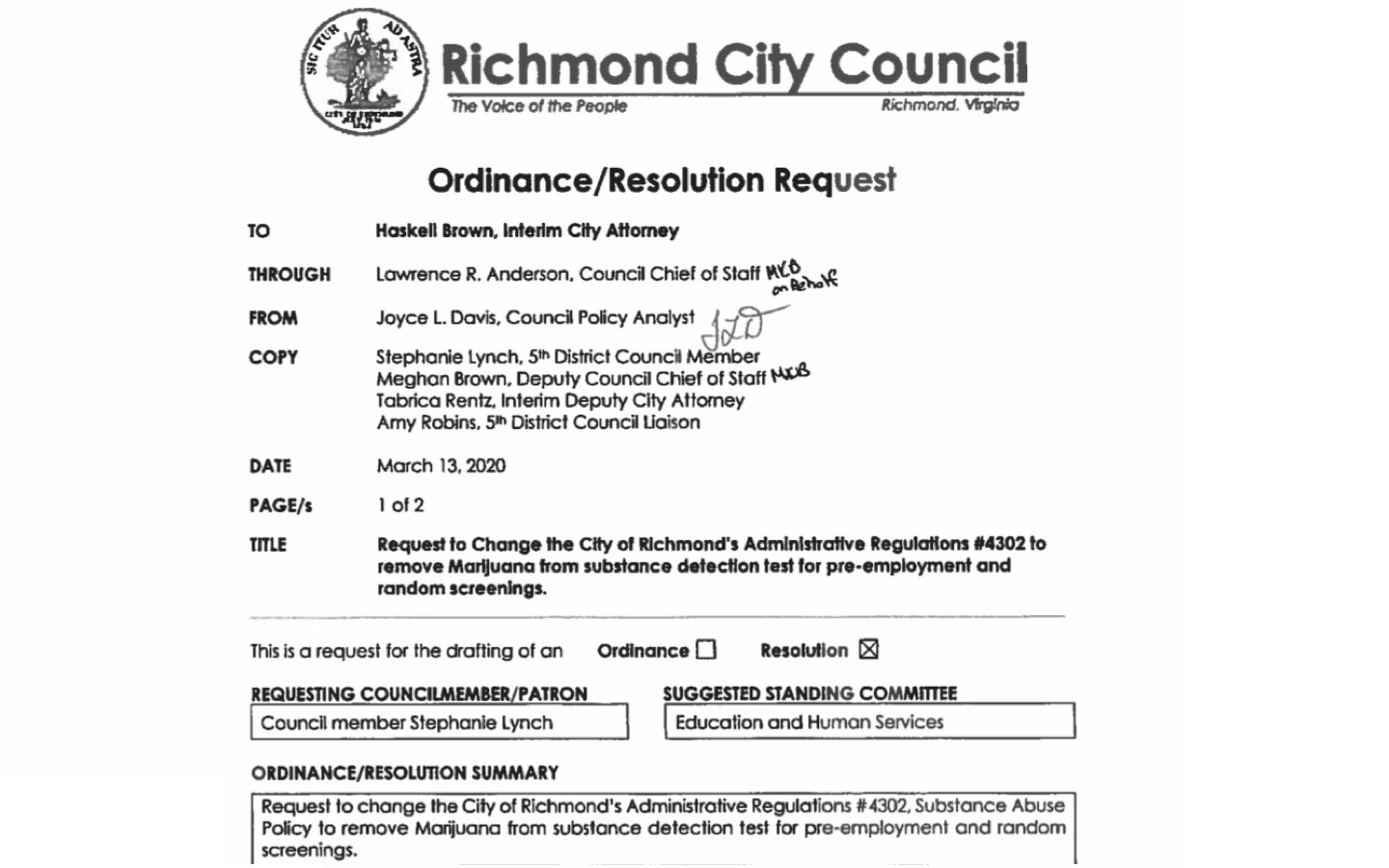Last week, Richmond’s City Council approved a resolution that would stop the city from drug testing employees for cannabis. Currently, Richmond drug tests for cannabis for pre-employment and randomly drug tests current city employees. But now, with Virginia getting ready to institute its medicinal cannabis program—as well as decriminalization of up to an ounce and considerations of cannabis for legalized recreational adult use—Richmond has approved the resolution, introduced earlier this month by Richmond councilperson Stephanie Lynch.
Resolution 030, “exclude[s] from substance detection testing the testing of City employees and applicants for employment with the City, except for public safety personnel and applicants for public safety positions, for marijuana use.” The exception mentioned in the resolution exists because of federal regulations (because cannabis remains a Schedule I drug and is federally illegal) regarding commercial drivers and city jobs where there are safety concerns tied to impairment.
At the May 7 Richmond City Council Education and Human Services Standing Committee meeting, Lynch explained why she introduced the resolution.
“The impetus for this paper is really the passing of legislation that happened in this 2020 General Assembly session which now really extends the legality of medicinal marijuana use to all Virginia citizens as long as they get a prescription from a physician,” Lynch said. “So within our city limits we have a medical marijuana distributor and pharmacist and so if we are going to allow for and encourage our citizens to use medicinal marijuana for medicinal purposes but then they could potentially face termination as a result of using that medicine, it seems to kinda run counterintuitive of what the state legislation intends to do.”
Lynch added that current drug testing for cannabis prevents the city from hiring people and has resulted in some people losing their jobs.
“‘We’ve heard anecdotally that many employees have lost their jobs as a result of failing a drug test [for cannabis],” Lynch said. “So, you know, it’s hard to find good employees, it’s hard to find good city staff and if this is another way to maintain and keep bringing on city staff then certainly it’s a measure to help do so.”
The meeting of the Education and Human Services Standing Committee, which was live streamed, did not include any members of the public who signed up to speak over the call. And during committee discussion, the concern was more about some of the nuances and complexities regarding the change to the policy than any opposition.
City Councilperson Chris Hilbert explained that he supported the resolution and more than that, said he hoped Virginia could soon become Colorado in terms of cannabis reform. But, he stressed, the public should know that the resolution does not apply to the members of the City Council.
The Richmond City Charter says, “the mayor or any member of council who shall be convicted by a final judgment of any court from which no appeal has been taken or which has been affirmed by a court of last resort on a charge involving moral turpitude, or any felony, or any misdemeanor involving possession of marijuana or any controlled substances, shall forfeit his/her office.”
Hilbert noted the language specifically mentions marijuana—and even just a misdemeanor at that—is a throwback to an earlier less cannabis-friendly era (“the evil weed and all of that,” Hilbert joked) but that it is worth communicating this to the public.
“I’m willing to vote for the paper on the floor but I just want to make sure that people know that the council and mayor have a higher standard than the employees of the city,” Hilbert said. “[We are] not putting a burden on the employees and then we can do what we want.”
Jenn Michelle Pedini, Executive Director for Virginia National Organization for the Reform of Marijuana Laws (NORML) praised the council’s vote in a press release.
“Virginia’s first medical dispensaries will open this year, and the Commonwealth is in the process of studying a regulatory framework for adult-use,” Pedini said. “Now is the time for municipalities throughout the state to review and update their policies so they may better align with state law and public opinion.”






